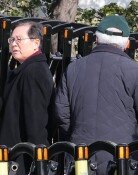Lingering Doubts over Gov`t Surveillance Probe
Lingering Doubts over Gov`t Surveillance Probe
Posted August. 12, 2010 08:54,
Prosecutors indicted Wednesday three staff members at the Prime Ministers Office while announcing the interim results of their investigation into the illegal surveillance of civilians by an ethical assistance employee at the office. The three include Lee In-kyu, former chief of the ethical assistance office, but exclude Lee Young-ho, former presidential assistant secretary for employment and labor who allegedly ordered the surveillance and was briefed on the results. Prosecutors cited lack of evidence against the latter. A witness testified that Lee Young-ho attended a dinner party at a workshop hosted by the ethical assistance office in summer 2008, but prosecutors did not pursue anything beyond this. They also failed to mention Park Young-joon, vice minister at the Prime Ministers Office, who came under fire for the alleged monopolization of power by a certain group with the same regional background.
Who can the public trust if prosecutors say only a Grade 2 civil servant was lying in a case in which even ruling party lawmakers such as Nam Kyung-pil, Chung Doo-un and Chung Tae-geun were suspected of being probed? The investigation into a major case appears to be ending despite failure to approach core suspicions over officials allegedly involved in unofficial channels of command or those in the top echelon even after drawing massive public attention. The probe will spawn an intensive political offensive by the opposition, which will probably demand an independent counsel or parliamentary investigation. Prosecutors always announce interim rather than the final results of their probe. They use the indefinite adjective interim because they feel their investigations cannot be justifiably construed as being sufficiently concluded.
Prosecutors began investigating the case nearly 15 days after news of it broke at the National Assembly June 21. They conducted a search and seizure July 9, four days after being asked by the Prime Ministers Office to conduct a probe. Amid the delay in the probe, computer hard drives were probably destroyed, thus removing crucial evidence that could have proven the involvement of higher-ranking officials.
Investigators say they found no hint of external infiltration though surveillance camera data suggest that an insider must have committed the illegal act. Korea introduced in 2001 an e-government system under which administrative processes are carried out via the Internet. The country ranked first among 192 countries this year in a U.N. survey of e-government systems. Even in a nation with such advanced information technology, prosecutors have failed to find a suspect in the case though records at a government agency were apparently destroyed by an insider. If materials can be disposed of in this way, Korea must return to a paper-based administration.
Government surveillance of civilians is an anachronistic and undemocratic crime. The criminal probe into the case will seem to protect high-ranking officials if it fails to get to the bottom of an incident in which officials ordered illegal surveillance of civilians and were briefed on the results. This is a practice straight out of the dark ages of Koreas previous authoritarian governments.







